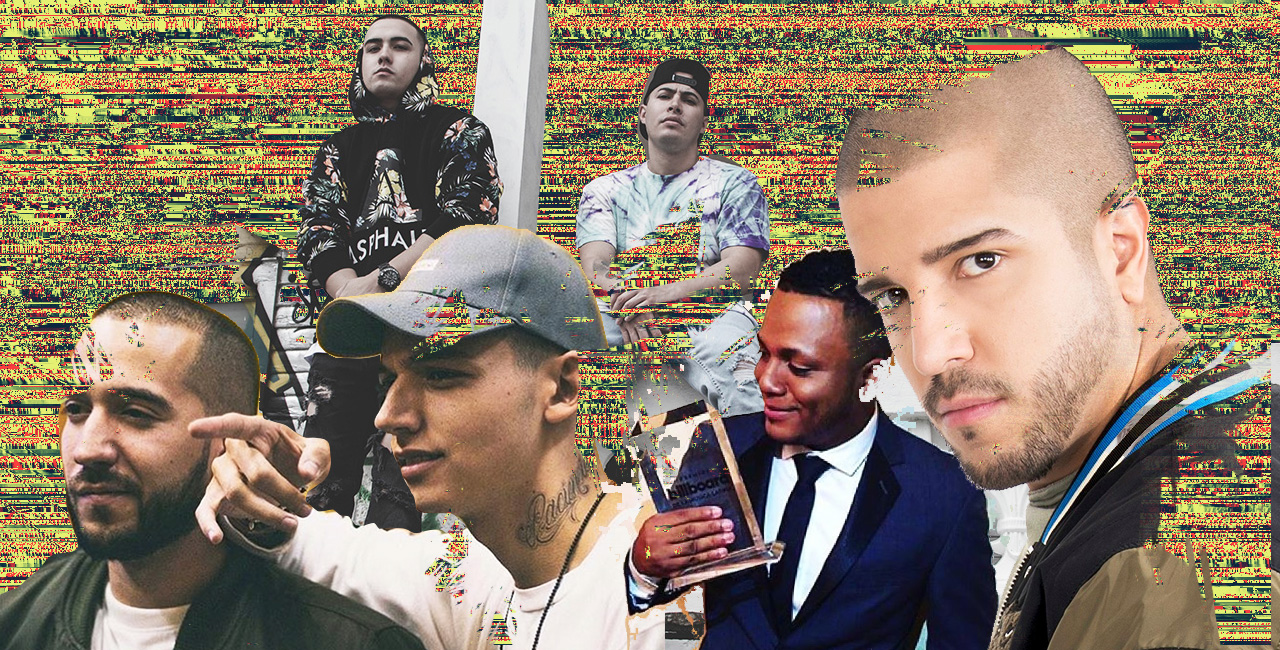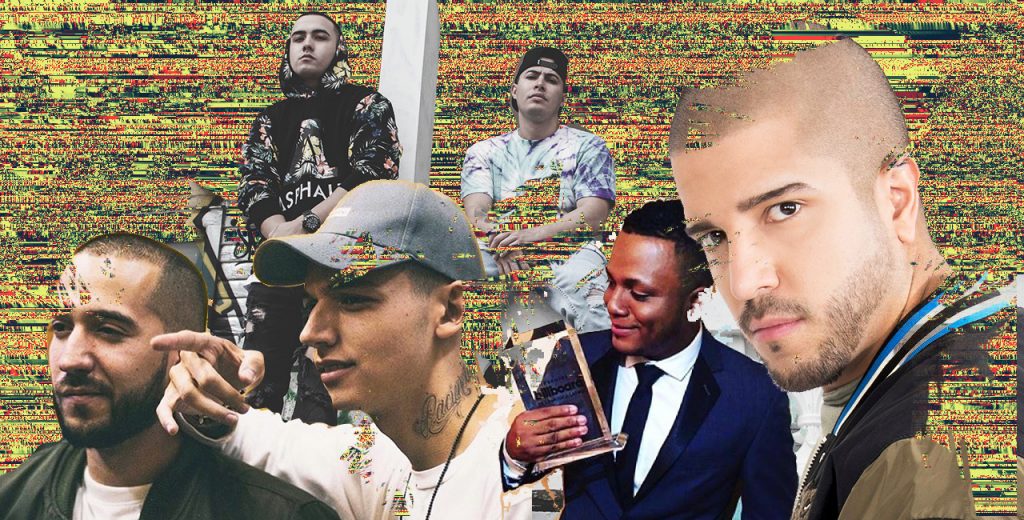Reggaetón suave/lento/pa’ bajo sounds are generating Billboard-charting hits, record-breaking YouTube views, and worldwide tours. Now a global phenomenon, the sound got its start in the home studio settings of Colombia’s music scene, and it continues to be guided by a small handful of producers based in Medellín.
This roster of beatmakers have sanded down reggaetón’s explosive, aggressive aesthetic into a smoother rendering of the dembow riddim, with lyrics that explore the intricacies of romance and heartbreak. These softer textures, many argue, have contributed to making reggaetón more palatable to the masses. So has the toned-down lyrical content; the current wave of hits leaves most – though not all – of the misogyny at home. But the sugary sounds of the new pop-reggaetón can also be read as an erasure of the genre’s political promise, and a departure from its origins as a site of resistance for poor, black Puerto Rican and Panamanian artists.
Whether you’re a fan of reggaetón’s new direction, or a diehard old-head, it’s clear that Medellín has fostered an ecosystem of producers, songwriters, and engineers that are now top picks for writing and publishing contracts in major international labels. These include go-to singer-producer duos like J Balvin’s ongoing projects with Sky and Mosty.
Each case study below is an example of proper timing, connecting emcees with producers, home studio grinding, and cosmic perreo alignment to create a broader force that’s dominating streaming today. Check out the producers guiding the new wave of pop-reggaetón below.
Update, 9/29/2017 6:15 p.m.: A previous version of this article erroneously stated that “Despacito” co-producer Mauricio Rengifo was born in Medellín. He is originally from Cali, so he has been removed from the list.
1
Sky
Alejandro Ramirez, also known as the Medellín-born producer Sky Rompiendo el Bajo (or Sky for short), has been by J Balvin’s side throughout his career. His voice even appears on “Safari” to lend an “a mí me gusta” hook behind the booth. As one of the key producers for Infinity Music, and more specifically for Balvin’s Energía album, Sky can be credited with lending definition to the sound that the above-ground and underground are seeking in reggaetón. He’s behind that signature reggaetonero Midas touch, landing “Safari” a no. 1 placement on the Billboard Latin Top 100.
Often working in tandem with Mosty, where Sky offers writing and production credits with a knack for integrating a more experimental electronic edge, the young producer seems to be hyper-aware of the importance of opening up his home-bred scene and textured sound as a motivator for people at home to see what’s possible for their own career growth. As he told Billboard, “The urban artists here in Colombia, they see what’s happening with Balvin and Nicky Jam, and everyone’s motivated – not only in urban music, but also reggaetón. There was a time when that music wasn’t on the charts…and now that reggaetón has come back, it has returned to its essence, but with a Colombian touch.” After raking in Latin Grammy, Premios Lo Nuestro, and Billboard nominations, Sky is a testament to how far this reach can really extend.
2
Mosty
With the proliferation of the Medellín boom, analysis about the sociopolitical factors that could have led to a definitively softer-edged sound quickly followed. Producers like Sky and Mosty, integral to the definition of this sound, are quick to confirm their intentionality around developing something that quite simply shows a different side of their country and the technical prowess of the genre. Mosty holds down recording, mixing, and mastering duties in the Infinity Music home base (check any J Balvin track for the “Infinity” drop as proof).
As Jose Osorio Balvin previously told the FADER, “We have a very violent past. We’ve lived the stuff people see in movies and we didn’t like it. The country wants to move past that stuff.” Cue Mosty, who’s elaborated on the subject, saying, “Our reggaeton is less of a street genre. Violence in Colombia is not something we’re proud of, so we like to concentrate on the positive.” With an intentionally softer engineering style that doesn’t overpower vocals – instead of the more explosive style that’s been traditionally associated with the genre – Mosty’s production technicality leaves room for the storytelling of the tracks to come through. Seen early on in their meteoric crossover to the mainstream with co-production duties shared with Sky on J Balvin’s fight-and-make-up anthem “Ay Vamos” (which later earned them a Latin Grammy in the 2015 Best Urban Song category), Sky and Mosty’s beats provide the relaxed, swoon-worthy foundation for lyricism that avoids glorifying violence, and in some cases, abandons the more stereotypical machismo of the genre.
3
The Rude Boyz
The Rude Boyz (aka Kevin ADG and Chan El Genio, or Kevin Mauricio Jiménez Londoño and Bryan Lezcano Chaverra) have recently joined the Sony ATV roster following their dedicated efforts to grow their home city’s scene. Starting with what’s described on their Wikipedia page as a “basic knowledge of piano and synthesizer,” The Rude Boyz are a testament to the power of leveraging these skills in the Digital Audio Workspace realm, which created the fundamental backbone for the growth of the national scene, specifically with artists like Reykon and Maluma between 2008-2012, way before the international contracts came along.
In their case, this digital skillset eventually translated into a month-long residency in Shakira’s studio (which led to production credits for “Chantaje”), as well as hits for Prince Royce, Yandel, Maluma, Cosculluela, Luigi 21 – the list goes on and on. Now with a studio in the Envigado-Antioquia neighborhood, and with a fresh, long-term, worldwide publishing deal, The Rude Boyz were recently the force behind la Kali Uchis’ first track entirely in Spanish, “Nuestro Planeta,” featuring Reykon. Both the single and video were designed with a specifically Medellín-driven aesthetic, which Kali Uchis detailed in an interview with Remezcla earlier this month.
4
Saga WhiteBlack
What Sky and Mosty are to J Balvin, Saga WhiteBlack is to Nicky Jam. Born in Quibdó, capital city of El Choco, and now residing in Medellín, Saga WhiteBlack is a fundamental household name in the La Industra, Inc. production, management, publishing, and songwriting group. There, he’s honed the instrumental soundtrack to accompany Nicky Jam’s “I messed up; I’m not the best” comeback story.
Born Cristhian Camilo Mena Moreno, Saga WhiteBlack teamed up with Nicky Jam to begin on the redefinition of his sound, which was a departure from his dancehall-inflected repertoire as a producer, a scene that also has deep roots in Colombia’s national scene. Linking with Nicky Jam after his relocation to his Medellín farm 45 minutes outside of the city, they began a collaboration that has carried through to channel Jam’s own exploration of “humble narratives he heard in Colombia’s vallenato music,” which led to him “exploring his own vulnerabilities,” as he told The New York Times. Cue “El Perdón” and “Hasta el Amenecer,” which spawned historic runs for the producer-singer duo at no. 1 on the Billboard Hot Latin Songs chart. The consistent production and songwriting quality lends fuel to the parallel success of Nicky Jam alongside J Balvin, which they’ve embraced with a friendly insistence that they consider each other “competitors, not rivals.”
5
Bull Nene
On the songwriting frontier, the genre would not be where it is today without 24-year-old Bull Nene, who boasts songwriting credits on a paisa perreo list of dreams: J Balvin’s “Bobo,” “Ginza,” “Yo te lo dije,” “Sigo Extrañándote,” “Ay Vamos,” “Malvada” and Maluma’s “Borro Cassette” among them. Before making major moves as part of the Infinity Music production crew, Bull Nene found his beginnings as part of the duo Jowan y Bull Nene (with beats powered by Sky Rompiendo el Bajo), eventually moving behind the boards and penning hits for J Balvin, Maluma, and Reykon. The songwriter played an integral role in the creation of J Balvin’s Energía, joining in on an avalanche of combined forces that stretched beyond the fundamental Infinity Music team, calling on contributions from Pharrell, Bia, and Fuego as well.
Bull Nene (aka René Cano) joined Warner/Chappell Music in 2016, with EVP/GM U.S. Latin and Latin America Gustavo Menéndez confirming that this would be his first major publishing agreement following individual deals with independent publishers. As reported by Billboard, Bull Nene is now at work creating new music with Juanes, proving that the “put some dembow on it” mantra of the industry has yet to falter.
6
Andrés Castro
Coming from a significantly different vantage point (i.e., the very above-ground move toward dialogue with the underground), Andrés Castro could be considered a force in the spread of the Medellín sound. Castro is a guitarist by training, already a longtime candidate in the Latin Grammy and Latin Billboards nominations pool (and an ASCAP Latin Songwriter of the Year award winner in 2014), thanks to his previous work with pop heavy-hitters Shakira, Ricky Martin, Carlos Vives, and Prince Royce. This experience lends another angle to the proliferation of the reggaetón-lite sound, heard most succinctly in his work as a composer and producer for Maluma’s Pretty Boy, Dirty Boy in 2015.
As with other producers on this list, like Saga WhiteBlack and Sky, Castro is a bridge between Colombia and its extension into the U.S.-centered market, since he has relocated to Miami and inked a publishing deal with Sony/ATV’s Latin division. With composer-producer credits on Carlos Vives and Shakira’s “La Bicicleta” and Maluma and Shakira’s “Chantaje,” it’s not surprising to see a glossed-out dembow riddim propel his ongoing relationships with top pop names into dialogue with the undeniable ascension of Medellín’s own breed of reggaetón.




